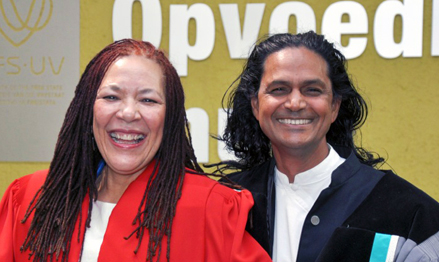Latest News Archive
Please select Category, Year, and then Month to display items
12 January 2024
|
Story Nonsindiswe Qwabe
|
Photo Sonia Small
 Since joining the UFS in 2008, Dr Grey Magaiza has worked extensively on approaches that can foster the socio-economic transformation of societies.
Since joining the UFS in 2008, Dr Grey Magaiza has worked extensively on approaches that can foster the socio-economic transformation of societies.
“The future should be one where communities can decide on their development agenda and futures. That’s the most important for me.” Dr Grey Magaiza, Deputy Director of the Centre for Gender and Africa Studies (CGAS) and Head of the Community Development programme on the Qwaqwa Campus, is passionate about capacitating communities to be agents of change and advancement. His vision for the future emphasises the empowerment of communities to take charge of their development by actively participating in decision making and the implementation of development projects that can improve their lives.
Since joining the UFS in 2008, Dr Magaiza has worked extensively on approaches that can foster the socio-economic transformation of societies. Over the years, he has crafted his research speciality into one that he is most proud of – being an interdisciplinary scientist immersed in the development of communities.
“I’m in a fortunate position of researching what I like. I say ‘fortunate’, because I’ve taken the time to understand what I’m passionate about, which is the overall field of rural livelihoods and livelihood futures – in short, community development. My research starts from an engaged university, understanding the elements that a university must use to enhance transformation and relevance to its immediate community in terms of development.”
One of the ways he has done this is by looking at social entrepreneurship as a development approach for young people in a rural setting. Through workshops with non-profit and civic organisations in Qwaqwa, Dr Magaiza has been helping these organisations to map out their needs and actively meet them through the involvement and support of external role players.
“We understand that communities are part of the national development agenda, but even that national agenda respects community knowledge and intentions and allows communities to shape their identity. A critical enabler of this is community organising. You bring back the capacity in communities to have dialogues on issues affecting them as spaces for engagement, knowledge exchange, and for people to just talk about their way forward.”
By enabling communities to define their development agenda, they can address their specific needs, challenges, and aspirations, he said. “When I look at livelihood futures, it’s quite an exciting aspect of my work – it’s like looking into a fortune tellers’ globe, because you’re not deciding for communities what they should do, but the communities themselves take those decisions.”
Rhodes professor calls for accountability in teacher education
2013-11-14
|
 |
Prof Jean Baxen of Rhodes University and Prof Dennis Francis, Dean of the Faculty of Education of the UFS.
Photo: Stephen Collett
15 November 2013 |
Lecture (pdf)
“Our education system needs quality teacher education.”
This was the message from Prof Jean Baxen, Deputy Dean of Research at Rhodes University in Grahamstown. She delivered the Education Public Lecture on ‘The lives of children, citizenship and teacher education: challenges and opportunities’ at the University of the Free State’s Bloemfontein Campus.
Growing up in White River, the rural areas of Eastern Transvaal (as it was previously known), Prof Baxen took the audience on a journey of the imagination. She shared stories of how she and fellow learners walked miles to get to school and how her son found himself in a situation of being unsure about his own racial identity, questioning what it meant to be ‘coloured’. She also related stories of how teachers are not sufficiently prepared to mediate information on HIV/Aids.
These stories revealed how little teachers cared, and also how difficult and challenging it is for learners to cope in such teaching and learning environments – thus calling for quality teacher education.
She stressed the fact that quality teacher education is needed in South Africa to assist in curbing the challenges children and fellow citizens come across in our broader society. “It is important that, as teacher educators, we should groom teachers to find and understand their identity, sexuality, and also the world they live in. There is an urgent need for us to hold ourselves and others accountable and to not distance ourselves and make it someone else’s responsibility – it is our joint responsibility as citizens,” she said.
We need a pedagogy that would navigate and start formulating a language that we could use to face these challenges, she proposed.